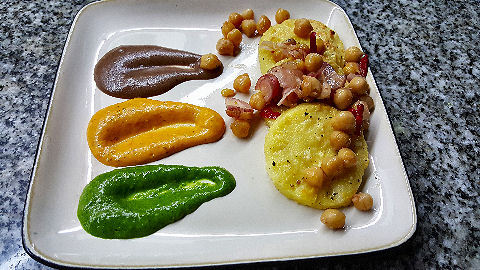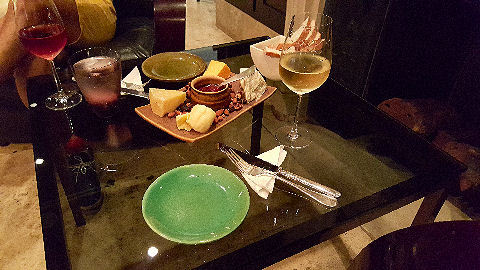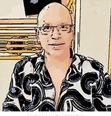Dan Perlman's Blog, page 6
January 24, 2016
Thirty Days – Favorite Plates
Just a look back at the last thirty days of dinners and some favorites out of the various dinners.
 A raved about favorite over the last year since we introduced it and brought it back numerous times, our combination Parihuela-Chupe, a tomato based seafood soup with a touch of dairy, miso, herbs, and plenty of chili heat.
A raved about favorite over the last year since we introduced it and brought it back numerous times, our combination Parihuela-Chupe, a tomato based seafood soup with a touch of dairy, miso, herbs, and plenty of chili heat.
 I’d call this a contentious dish, but the truth is, only one couple over four nights of serving it found it lacking. Along with the fact that we didn’t serve MEAT every cours...
I’d call this a contentious dish, but the truth is, only one couple over four nights of serving it found it lacking. Along with the fact that we didn’t serve MEAT every cours...
January 21, 2016
Getting Around – There’s An App For That
The news hit here that Google Maps has added in public transit to its navigational strategies here in BA, and I thought it would be interesting to look at the options. They’re certainly not the first to do so, and right off the bat I can think of a trio of phone and desktop apps that have done the same for anywhere from a year or two on up to almost as long as I’ve lived in town.
The various choices (and I’m happy to hear about more and check them out), are the city government’s interactive m...
January 19, 2016
Bite Marks #24
I return from a self-imposed two week blogging hiatus, I needed to put my attention on other writing and home projects, and just take a break, refresh, and come back to it. Lots of stuff fixed and/or replaced around the apartment that I’ve been letting slide!
You know the drill – the good, the bad, the pretty, the ugly…. This time, it’s all very casual eats.

I’m going to lead off with a much anticipated opening in the burger world, The Burger Company, Honduras 4733 in Palermo (and more to co...
January 5, 2016
The Bread & Soup Project #10 – Australia
 Time for Round #10 of The Bread & Soup Project! So it seems that Australia, as a whole, just isn’t all that into soup. I checked in with friends, and my youngest brother, who live there, and the general consensus was, soup’s just not much of a thing. I broached the subject of the infamous “pie floater”, a meat pie nestled into a bowl of split pea soup. Now, I remember seeing it on menus in cafes when I was in Sydney back in the late 80s. I didn’t hit cafes on my return visit in 2002, so I can...
Time for Round #10 of The Bread & Soup Project! So it seems that Australia, as a whole, just isn’t all that into soup. I checked in with friends, and my youngest brother, who live there, and the general consensus was, soup’s just not much of a thing. I broached the subject of the infamous “pie floater”, a meat pie nestled into a bowl of split pea soup. Now, I remember seeing it on menus in cafes when I was in Sydney back in the late 80s. I didn’t hit cafes on my return visit in 2002, so I can...
The Book Stack #2

What have we this time around?
You look at the title, Bread Wine Chocolate, and you’re already engaged. I mean, what’s not to like? Clearly three items selected from the book to grab our attention, since in reality, the book is, in order, Wine Chocolate Coffee Beer Bread Octopus. The book came highly anticipated, with suggestions being bandied about that this would be the next big, amazing food book. I clicked a link, put in my Kindle cue to be purchased when it was released, and more or less forgot about it until it showed up one day. I might have left my cursor hovering over the button rather than clicking, had I taken a moment to check out the author, Simran Sethi, a former MTV producer turned news anchor for, oh, MTV, who has gone on to continue work in the media world for various… how can I put this politely… touchie feelie outlets like Mother Earth News and TreeHugger. I’m not, at all, against the environment, sustainability, or anything else of the sort, don’t get me wrong, but it might have had me wondering about her bias in advance, rather than after the fact.
Though in truth, it’s not her bias that ruins this book for me. It’s her writing. I really wanted to like the book. There’s some great, well researched information in it. The problem is, it’s presented in a manner that ping-pongs back and forth between journalistic factual reporting and breathless golly gee whiz wow teen girl gossip style at a pace that would make the cut editors of Reality Bites envious. She also comes across as really, really, self absorbed, self indulgent, and self anything else you might care to insert, as she wings her way across the world with hand-grinder for coffee beans in one hand and an Aeropress brewer in the other, ruing that she isn’t back home with her Keurig machine (oh yeah, all those K-cups are just great for the environment) and her $13 designer chocolate bars. She spends the first couple of chapters of the book outlining what she’s going to cover and why she’s the one to do so, and how much we’re going to appreciate her having done so. Yes, yes, she got down and dirty with the folk who produce these various products, and sampled and tasted and learned to appreciate things at their source. And then promptly trundled back to her hotel to soak in the tub and anxiously write her next words on the balcony at sunset and then jet off to another exotic locale. If you like to hug trees, you’ll probably like this book.
I mentioned in the last book round-up that I had started working my way through a proposed list of the 51 Best Fantasy series. I’m not sure why it didn’t occur to me, that if they’re rated from best, #1, to least best, #51, that progressively, I might like these series less, and less. I’m not sure that will hold true completely – after all, as I mentioned then as well, the Discworld canon wouldn’t even make it onto my list of good, let alone 7th Best. But there does seem to be a slight decline each round. I’ve started in on Joe Abercrombie’s The First Law trilogy, beginning with The Blade Itself. It’s a relatively easy read.
There are things about it I really like – it’s written in a light-hearted tone, with a bit of humor. The series is often compared to Song of Fire and Ice, the Game of Thrones inspiring stack of books, and in some ways, I can see that – the action sequences, the bloody, grisly, details. But in other ways, not so much – the political manipulations and intrigue are there, but more or less ho-hum, there doesn’t seem to be any big, sweeping vista – within the first few chapters it’s obvious that all the lead characters’ lives are going to quite quickly intersect, in a pretty predictable way. Some reviewers have said that that gets turned on its head as the trilogy progresses, and by the end of the third book, nothing will be as anticipated. I can only hope so. It’s interesting enough to continue forward.
One of the finest books from one of the early crafters of modern science fiction, Alfred Bester’s The Stars My Destination is a long time favorite that I hadn’t read in quite some time. Another list of “bests”, this time from io9, The Essential Cyberpunk Reading List starts off with this one.
Filled with Evil Corporations, interplanetary intrigue, bio-engineering, power, greed, revenge, and the obligatory Sub-Culture, this has all the elements that make for a great cyberpunk read. Given when this was written, in the early 1950s, it’s a brilliant precursor to that movement at a time when “cyber” didn’t yet mean anything and “punk” meant something completely different. Gripping story, fast paced action, and even it’s own “street” language that fits the genre perfectly. It’s a relatively short book (or at least in comparison to some of those I’ve been reading recently), and with its pace, it’s the sort you can sit down and read through on a rainy afternoon.
A couple of years ago I read the book Of Dice and Men, a look back at the early days of Dungeons & Dragons, and, those of us nerds who played it. I was an avid player of the game back in the mid to late 70s, and have continued a fascination with the world(s) created by Gary Gygax and Dave Arneson, the original duo behind the game. I’ve gone on to play computer based games, both early ones that were limited to being installed on your computer and played by one or a couple of people, and on, to MMORPGs, the massive universes created online like Everquest and Worlds of Warcraft.
The earlier book I mentioned was mostly focused on the game itself, and the gamers who took it and ran with it. There was plenty of biographical information about the creators, but you couldn’t call it biography. Michael Witwer’s Empire of Imagination takes another run at it. As he says in the introduction, he couldn’t believe when he started researching the book that no one had ever written a biography of Gary Gygax, who, while not a household name except to those of us in the gaming world, created something that went on to be the foundation for things we take for granted in modern day life, everything from the use of computers for games, to the advent of social media. As he also points out, it’s telling, that in an episode of the pop-culture show Futurama, Gygax’s character is paired up with Lieutenant Uhura, Al Gore, and Steven Hawking – taking on the universe. The book is well written, completely engaging, and for anyone with an interest in the topic, a must read.







January 2, 2016
The Annual Round-Up v. 2.0.1.5
Time once again for that annual look back at whatever, in my mind, made last year interesting.
Let’s hit the Casa SaltShaker stuff first. 120 dinners, 1041 people. That’s pretty much the same as the previous year, at 123 dinners and 1096 people. Those are both a drop from the previous couple of years which ran closer to 140-150 dinners and around 1200-1300 people. Mostly, I think that’s due to taking more vacation time – both of these last years we took six weeks off rather than our usual th...
December 27, 2015
Wine, More Wine
 Colonia Las Liebres Bonarda Rosé Brut Nature 2013, Mendoza, Argentina – pale pink, holding to the rim; apricot and minerals on the nose; moderate acidity, austere, bone dry, in fact, to the level I’m surprised this is classified as a Brut, I didn’t detect any residual sugar at all, light to medium bodied, minerally, under-ripe apricot and plum, elegant; long finish, minerally. I’m fairly certain this is the only sparkling Bonarda I’ve ever tried. [Recommended]
Colonia Las Liebres Bonarda Rosé Brut Nature 2013, Mendoza, Argentina – pale pink, holding to the rim; apricot and minerals on the nose; moderate acidity, austere, bone dry, in fact, to the level I’m surprised this is classified as a Brut, I didn’t detect any residual sugar at all, light to medium bodied, minerally, under-ripe apricot and plum, elegant; long finish, minerally. I’m fairly certain this is the only sparkling Bonarda I’ve ever tried. [Recommended]
The Book Stack #1

A selection out of what I’ve been reading recently. They don’t really need an introduction.
I like Charles Pierce’s writing, and he often hits the nail on the head. This book, Idiot America: How Stupidity Became a Virtue in the Land of the Free, is no exception. For the most part, he just lays it out there and shows just how idiotic many things in our country have become. Do I always agree with him? No. But it’s always thought provoking. Does he always make his case? No. He does against the “easy” targets, where he can just point out flaws that probably any thinking person would immediately see. But when it comes to making fun of, which is really what the book is, targets where there are philosophical, moral, ethical, even intellectual debate (particularly with arenas that broach into the world of religious faith), he points, but doesn’t provide the backup evidence, making the assumption that anyone reading his book is of like mind with him, and will simply agree that whatever he’s pointed to is worthy of mockery. For those of us who struggle at times with reconciling science, logic, and faith into a composite whole, those chapters come across a bit smarmy. Still, a recommended read, just to get the mental cogs turning.
Secretly, I grew up kind of wanting to be Alexander Mundy. He was the cat burglar turned spy-thief for the Secret Intelligence Agency of the US government in the late 60s television series It Takes a Thief. The show was inspired by the Hitchcock film To Catch a Thief (1955) starring Cary Grant, and on the flipside, while not acknowledged, is probably in the background of things like the late 2000s show White Collar, and certainly has some influences from the life of Frank Abagnale, whose life then went on to inspire the Spielberg film Catch Me If You Can. All that aside, I had visions of being a cat burglar, when I wasn’t entertaining visions of being a forest ranger or FBI agent. How things change as we grow up. I’ve always maintained a fascination with the news of jewel and art thieves, and while now there’s simply no likelihood of taking either up as a profession, I enjoy reading about the heists. Still one of, if not the largest, diamond theft in history, the story in Flawless: Inside the Largest Diamond Heist in History is a reasonably in-depth analysis of the most likely scenario for how the theft went down. Some of it is clearly speculative, especially attributions of motivations and thought processes lent to the main actor, Leonardo Notarbartolo (after whom I’ve named a Pandaren rogue in World of Warcraft, for those into that sort of thing). And some of it is pieced together from what evidence and testimony was available to the authors, Scott Andrew Selby and Greg Campbell. It’s clearly well researched and very well written. If I have any quibble with the book is that the ending is an awfully quick wrap-up – akin to the sort of thing one sees at the end of a competition show, where the eliminated contestant’s picture is shown for a moment along with a caption of “John Smith is happy back with his family and thinking about what to do next.” One wants to know, “Where are they now? What are they up to?” Well worth a read.
A few months back, Buzzfeed published a list of what they considered the 51 Best Fantasy Series ever written. Now, there’s nothing that says that anyone at Buzzfeed is an expert on the topic, nor that the choice of 51 (why 51?) series was a good one, but I was casting about for somethings interesting to read and thought I’d start in on the list. I quickly read through the first couple of series, I’m not going to go back and review them now as my memory is already getting hazy on them, but I highly recommend all of Patrick Rothfuss’ The Kingkiller Chronicles, Brandon Sanderson’s The Stormlight Archive, and Brent Weeks’ The Lightbringer series, particularly the first, which was one of the best fantasy series I’ve ever read, though the next two series are almost as good. All captured my attention and engaged me, and I was glad to have discovered them via the list. I skipped over A Song of Ice and Fire by George R.R. Martin (the books behind Game of Thrones) and Tolkein’s Lord of the Rings, simply because I’ve read them in the past. And I’m going to skip the 41 novels of the Discworld saga from Pratchett, because I’ve given them a try, and after 1½ of them, read a year or two ago, I just gave up on them as simply not my cup of weak tea.
Now, to this series, His Dark Materials by Philip Pullman, including three novels, The Golden Compass (aka Northern Lights), The Subtle Knife, and The Amber Spyglass. It feels a bit more like a teen read than an adult fantasy read. Some of that is simply the characters, the primary ones being children in their early teens. But more of it is that it’s written in a borderline puerile style. I found that although I enjoyed them, I wasn’t particularly engaged by them. There’s a lot of railing against what is an awfully thinly veiled Catholic church, and of a government influenced by religious leaders, clearly the author isn’t a fan of either. There’s a lot of moralizing, but it’s very superficial. And in the end, the ostensible resolution is pretty insipid. The first volume has been turned into a movie of the same name, and albeit also pretty kid-oriented and “Hollywood”, is actually better than the book, a rarity in my experience. While not bad reads, there are certainly other books in the genre more worth putting your time into, as noted above.







December 22, 2015
Bite Marks #23
Welcome to the 23rd installment of Bite Marks, my roughly every 3-4 week round-up of what we’ve been eating. Some of it is destined for further exploration, some of it is simply a reminder of the existence of some favorite spots, and some of it will be left by the wayside, never to be revisited. Let’s see what we’ve got in the photo files!

Let’s start off a bit on the “luxe” side of things. A friend from Santiago was in town for a couple of days with her husband, and offered to bring me my f...
December 18, 2015
The Bread & Soup Project #9 – Aruba
Aruba is an island nation in the Caribbean, a good distance to the west of the Lesser Antilles (remember the Antilles?), and located just a mere 18 miles north of the Venezuelan coast. Over time, it’s been “handed off” (such a polite term for the way I imagine it happened) from the Spanish to the Dutch – its original inhabitants were Caquetios Amerinds from Venezuela, then colonized in the 16th century by the Spanish, and then taken over by the Dutch in 1636. Starting in 1947 a quasi-independ...




